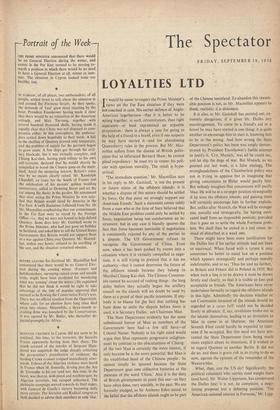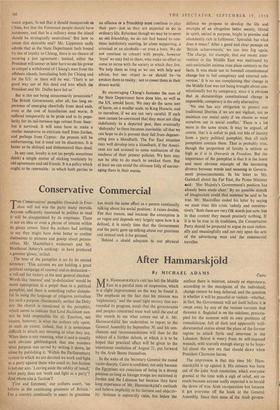LOYALTIES LTD
TT would be easier to respect the Prime Minister's 'views on the Far East situation if they were not couched in cant. His earlier defence of Anglo- American togetherness—that it is better to be wrong together, in such circumstances, than right separately—at least represented an arguable proposition : there is always a case for going to the help of a friend in a brawl, even if one suspects he may have started it—and for abandoning Queensberry rules in the process. But Mr. Mac- millan suffers from the disease of British politi- cians that so infuriated Bernard Shaw; he cannot plead expediency : he must try to veneer his poli- cies with specious morality. The result is hypo- critical.
`The immediate question,' Mr. Macmillan says in his reply to Mr. Gaitskell, 'is not the present or future status of the offshore islands; it is whether a dispute of this nature should be settled by force. On that point we strongly support mit. American friends.' Such a statement comes oddly from a man who at the time of Suez believed that the Middle East problem could only be settled by force, negotiation being too cumbersome an in- strument; but in any case it blandly ignores the fact that force becomes inevitable if negotiation is consistently rejected by any of the parties to a dispute. The US Government refuses to recognise the Government of China. Even now, when it has been pushed by events into a • situation where it is virtually compelled to nego- tiate, it is still trying to pretend that it has no authority—that it cannot determine the future of the offshore islands because they belong to Marshal Chiang Kai-shek. The Chinese Commun- ists cannot be accused of rushing things : the long delay before they actually began the artillery assault on the islands will no doubt be used by them as a proof of their pacific intentions. If any- body is to blame for the fact that nothing has been done to settle the dispute before force is used, it is Secretary Dulles : not Chairman Mao.
The State Department evidently has the same unbalanced horror of Mao as members of the Government here had—a few still have—of Colonel Nasser. Nobody in his right mind would argue that Mao represents progressive enlighten- ment by contrast to the obscurantism of Chiang : of the two Mao is certainly the more sinister, if only because he is the more powerful. But Mao is the established head of the Chinese people : he cannot simply be ignored because the State Department goes into collective hysterics at the mention of the word 'China.' And it is the duty of British governments to point this out—as they have often done, very sensibly, in the past. We are formally pledged, as Sir Anthony Eden stated, to the belief that the offshore islands ought to be part of the Chinese mainland. To abandon this reason- able position is not, as Mr. Macmillan appears to think, realistic; it is dishonest.
It is also, as Mr. Gaitskell has pointed out, ex- tremely dangerous, if it gives Mr. Dulles any encouragement. To come to a friend's aid in a brawl he may have started is one thing; it is quite another to encourage him to start it, knowing him to be in the wrong. And how wrong the State Department's policy has been was amply demon- strated by President Eisenhower's feeble attempt to justify it. 'Cry, Munich,' was all he could say, and let slip the dogs of war. But Munich, as we pointed out last week, is a false analogy, The wrongheadedness of the Chamberlain policy was not in trying to appease but in imagining that giving concessions to Hitler would pacify him. But nobody imagines that concessions will pacify Mao. He will be in a stronger position strategically if he wins the offshore islands; and gaining them -will certainly encourage him to further' exploits. But, unlike after Munich, the West will be stronger too, morally and strategically, for having extri- cated itself from an impossible position; provided that it goes on to settle the whole Formosa prob- lem. We shall then be united in a just cause, in- stead of disturbed in a weak one.
There might have been more justification for the Dulles line if his earlier attitude had not been so equivocal. When faced with a tyrant it may sometimes be better to stand fast on a position which appears strategically and perhaps morally indefensible, and to say 'Thus far and no farther,' as Britain and France did in Poland in 1939. But when such aline is to be drawn it must be drawn firmly and clearly, so that it is visible to foes and acceptable to friends. The Americans have never undertaken formally to regard the offshore islands in this light. Admittedly the decision whether or not Communist invasion of the islands should be regarded as a cases Belli could not be decided firmly in advance; if, say, revolution broke out in the islands themselves, leading to an invitation to Mao to come in as liberator, the American Seventh Fleet could hardly be expected to inter- vene if he accepted. But this need not have pre- vented the State Department from being much more explicit about its intentions, if it wished us to regard Quemoy as another Berlin. It did not do so; and there is grave risk in its trying to do so now, against the opinion of the remainder of the Western bloc.
What, then, can the US do? Significantly, the political columnist who carries most weight there (and here), Mr. Walter Lippmann, has condemned the Dulles line; it is not, he complains, a nego-. tiating proposal but a debating position. 'The American national interest in Formosa,' Mr. Lipp. man Chin auto shou attai adm by ti sec u Presi to cc offs for good Pres Bt. The per[ even suffe larit but simil and emb bette In thin old ough a argues, 'is not that it should masquerade as a, but that the Formosan people should have aomy, and that in a military sense the island ld be strategically neutralised.' But how to a this desirable end? Mr. Lippmann sadly its that as the State Department feels bound es of loyalty to Chiang, there is no chance of ring a just agreement : instead, either the dent will sooner or later have to use his power ■ mpel a withdrawal of Chiang's men from the ,ore islands, humiliating both for Chiang and he US: or there will be war. 'There is no 1 way out of this dead end into which the [dent and Mr. Dulles have led us.'
it is this not being unnecessarily pessimistic? British Government, after all, has long ex- lice of emerging cheerfully from dead ends, at the cost of humiliation and worse. It red temporarily in its pride and in its popu- y for its tail-between-legs retreat from Suez : it survived. It will soon have to make a ar manoeuvre to extricate itself from Jordan, perhaps from Cyprus : the process will be massing, but it need not be disastrous. It is r to be disloyal and dishonoured than dead. any case, loyalty is not (as people sometimes ;) a simple matter of sticking 'resolutely by agreements and old friends. It is a policy which ht to be renewable : in which both parties to an alliance or a friendship must continue to play their part—just as they are expected to do in ordinary life. Reluctant though we may be to sever an old friendship, we do not feel bound to con- tinue indefinitely meeting, let alone supporting, a criminal or an alcoholic—or even a bore. We do not continue to consort with people, however loyal' we may feel to them, who make no effort to come to terms with the society in which they live. We help them as long as we can with help and advice, but our object is—or should be—to awaken them to reality: not to cosset them in their dream world.
By encouraging Chiang's fantasies the men of the State Department have done him, as well as the US, untold harm. We may do the same sort of harm, on a smaller scale, to King Hussein, and to ourselves, if we are not very careful. If such men cannot be convinced that they must not cling indefinitely to a departed past, then eventually 'disloyalty' to them becomes inevitable: all that we can hope to do is prevent their fall from degener- ating into a bloodbath. The Far East situation may well develop into a bloodbath, if the Ameri- cans are not aroused to some realisation of the madness of their present policies. We here may not be able to do much to awaken them. But at least we can avoid the ultimate folly of encour- aging them in their mania.



































 Previous page
Previous page